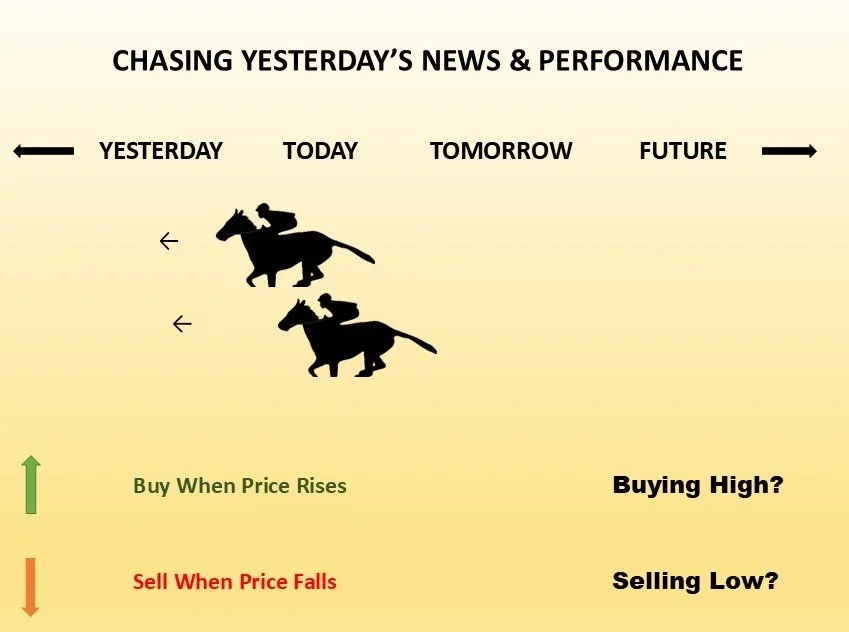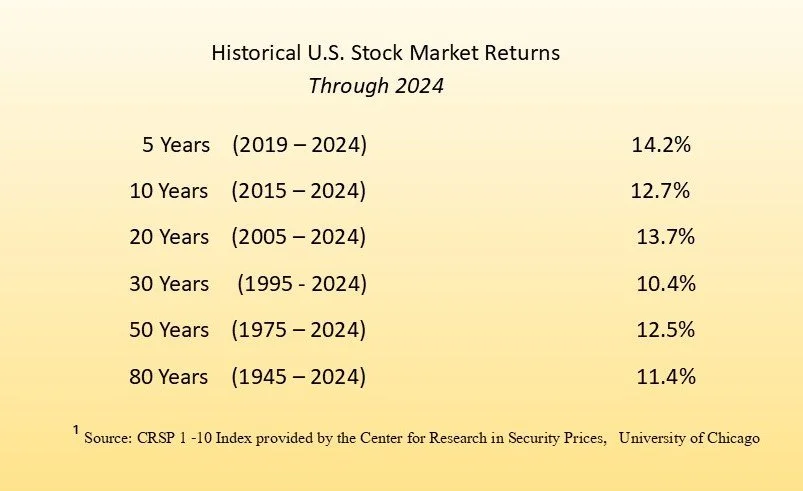Don’t Be Confused Between Investing and Speculating
The financial press refers to people participating in everyday securities trading as “investors.”. For example, you may hear or read, “The stock market surged today as investors took advantage of strong economic data..” or “The markets were down today as investors felt jitters from the latest inflation data and higher bond yields.” The danger of interpreting these daily summaries is acting on fear and other emotions that should be distinct from investing for the long-term. The approach of “what is right for them must be right for me“ is delving into speculation, not investing.
Zero-Sum Game
Investment speculation is a zero-sum game, meaning the amount of somebody’s gain will equal somebody else’s loss. Speculative investing creates a winner and a loser, but long-term investing allows all investors to benefit by taking advantage of the market’s process of rewarding investors’ risk with commensurate returns.
Chasing Yesterday’s News
When the price of someone’s stock is falling, it's natural for them to rid themselves of it, and when a stock is rising, it's logical to want to own it. However, when it comes to the capital markets, this type of thinking doesn’t serve the best interests of investors very well. Instead of moving forward by achieving objectives and letting the markets work for them, many investors look backward and base their investment strategies on yesterday’s news and performance. What tragically happens is they continue to repeat this cycle of buying when the price has already risen or selling when the price has already fallen – buying high and selling low – not the ideal recipe for a positive investment experience!
The Markets Are Efficient (Most of the Time)
Efficient market advocates believe that current prices reflect all available knowledge and expectations. Between $600 billion and $800 billion of securities are estimated to be traded daily in global markets. The folks who analyze security prices do this all day, every day. They are highly educated and skilled. The intense competition ensures a competitive and liquid market. All available information is processed in seconds, and stock prices adjust instantly. In other words, if somebody tells you that a particular stock is “over- or ” undervalued, either they have information that the entire global market is missing or the whole market has gotten it wrong – both scenarios are highly improbable. Although it's possible that mispriced securities can occur, there is no evidence that anybody can consistently predict price changes.
A 50/50 Proposition
Success in speculating or “short-term” trading depends on the 50/50 chance of being on the right side of the transaction. The probability of profit-making is even lower due to transaction costs and potential taxes on any gain.
A Solution
Below is a chart of U.S. Stock Market returns over periods as long as 80 years.
The above data support a fundamental investment principle – the longer the investment time horizon, the greater the chances of earning a positive return.
Hindsight is Great, Isn’t It?
If we knew which security values would rise or fall or where the markets were headed, we could time our investment decisions appropriately, sit back, and amass great fortunes. But the truth is, there is no evidence of anybody having, or ever having, the ability to predict short-term price changes consistently – the markets are too large and efficient! The good news for investors is that they don’t have to know which stocks are going up or down or if a bull or bear market is headed in our direction. We don’t need a crystal ball; the most important thing an investor needs to have a successful investment experience doesn’t require special training or knowledge, but is challenging to accept: discipline. However, discipline is a dirty word for transaction-oriented Wall Street firms and the financial press because the more disciplined an investor is, the less trading they will do.
The investor’s ability to withstand short-term volatility and remain focused on achieving well-planned objectives is the form of discipline we advocate. A client's investment strategies will be a function of their goals. Unless factors impacting their situations or objectives change, we strive to remain disciplined, rebalance when necessary, and let the markets work for us instead of against us.
Please take advantage of my no-charge consultation. The time invested will, at the very least, present you with information about your planning objectives. I can be reached at (925) 484-1671 or anthony@carrwealth.com if you would like to schedule an appointment or have a question.
Investments involve risks. The investment return and principal value of an investment may fluctuate so that an investor’s shares, when redeemed, may be worth more or less than their original value. Past performance is not a guarantee of future results. Diversification neither guarantees a profit nor assures protection against loss in a declining market. There are no guarantees that strategies will be successful.


